Among the most critical concerns for seniors are heart health and cancer prevention.
Both conditions can significantly affect quality of life, but the good news is that there are steps we can take to reduce the risks and promote better overall health. At Your Home Team Care, we believe in a holistic approach to senior care, and that includes offering guidance and support to families in ensuring their loved ones live healthier, longer lives.
The Connection Between Heart Health and Cancer Prevention
While heart disease and cancer are distinct conditions, they share many common risk factors, such as poor diet, lack of physical activity, and obesity. By focusing on heart health and cancer prevention together, seniors can take a holistic approach to their well-being. Lifestyle changes that improve heart health—such as regular exercise, a healthy diet, and weight management—also help lower cancer risk.
Moreover, mental and emotional health play important roles in both conditions. Chronic stress can negatively impact heart health and immune function, which in turn may increase the risk of cancer. Seniors who engage in social activities, practice relaxation techniques, and maintain a positive outlook are more likely to experience better health outcomes.
The Importance of Heart Health in Seniors
Heart disease remains one of the leading causes of death among seniors, and it can develop silently over time. High blood pressure, high cholesterol, and a lack of physical activity are just a few risk factors that contribute to cardiovascular problems. However, understanding these risks and taking steps to mitigate them can have a huge impact.
Risk Factors to Watch
Some of the key risk factors for heart disease include:
- High Blood Pressure: Known as the “silent killer,” high blood pressure often has no obvious symptoms. It can increase the risk of stroke, heart attack, and kidney disease. Regular blood pressure checks are crucial for seniors.
- Cholesterol Levels: Unhealthy cholesterol levels can lead to the build-up of plaque in the arteries, increasing the risk of heart attack and stroke. It’s important to manage both LDL (bad cholesterol) and HDL (good cholesterol) levels.
- Diabetes: Seniors with diabetes are at a higher risk for heart disease. Uncontrolled blood sugar levels can lead to damage to blood vessels and the heart.
- Obesity: Carrying extra weight, especially around the abdomen, increases the risk of developing heart disease. Weight management is important for heart health.
How to Protect Your Heart
The good news is that lifestyle changes can significantly reduce the risk of heart disease. Here are some heart-healthy habits for seniors:
- Regular Physical Activity: Aim for at least 150 minutes of moderate-intensity aerobic exercise per week, such as walking, swimming, or cycling. Exercise helps lower blood pressure, improve cholesterol levels, and maintain a healthy weight.
- Balanced Diet: Eating a diet rich in fruits, vegetables, whole grains, lean proteins, and healthy fats (like those found in fish, nuts, and olive oil) is essential for heart health. Limiting processed foods, salt, and added sugars is equally important.
- Medication Management: If prescribed medication for high blood pressure, cholesterol, or diabetes, make sure to follow the doctor’s instructions carefully. Regular check-ups with a healthcare provider are essential to manage these conditions effectively.
- Stress Reduction: Chronic stress can negatively affect heart health. Encourage activities like meditation, mindfulness, or spending time with loved ones to keep stress levels in check.
For more detailed heart health guidelines, visit the American Heart Association’s website here.

Cancer Prevention: Reducing Risks for Seniors
Cancer is another major health concern for seniors. The risk of developing cancer increases with age, but many types of cancer are preventable. Prevention starts with awareness of risk factors and lifestyle changes that promote overall health.
Common Risk Factors for Seniors
While genetics can play a role, lifestyle choices and environmental factors are often key contributors to cancer. Some risk factors include:
- Smoking: Smoking is one of the leading causes of lung cancer, and the risk of developing cancer increases with the number of years a person has smoked.
- Excessive Alcohol Consumption: Drinking alcohol in excess has been linked to several types of cancer, including those of the liver, breast, and mouth.
- Poor Diet: A diet high in red and processed meats, along with low fiber intake, has been associated with an increased risk of colorectal cancer.
- Obesity: Obesity increases the risk of developing cancers such as breast, colon, and pancreatic cancer.
- Lack of Physical Activity: Regular physical activity helps lower the risk of cancer by maintaining a healthy weight and improving immune function.
Steps for Cancer Prevention
Taking proactive steps to lower cancer risk can make a significant difference:
- Get Regular Screenings: Regular cancer screenings are crucial for early detection. For seniors, screenings for breast cancer, colon cancer, prostate cancer, and skin cancer are particularly important. Early detection often leads to better outcomes.
- Maintain a Healthy Weight: Maintaining a healthy weight reduces the risk of many types of cancer. A combination of healthy eating and regular exercise is the best way to manage weight.
- Avoid Tobacco and Limit Alcohol: Quitting smoking is the most important step a senior can take to reduce the risk of cancer. If you drink alcohol, it’s best to limit consumption to moderate levels.
- Eat a Nutrient-Dense Diet: A diet rich in fruits, vegetables, whole grains, and lean proteins provides antioxidants and other nutrients that help protect against cancer. Foods like berries, leafy greens, and cruciferous vegetables (e.g., broccoli and cauliflower) are especially beneficial.
- Protect Your Skin: Seniors are more susceptible to skin cancer, so wearing sunscreen, avoiding excessive sun exposure, and scheduling regular skin checks with a dermatologist are important steps in preventing skin cancer.
For additional information on cancer prevention, refer to resources provided by the National Cancer Institute here.
How Your Home Team Care Supports Senior Health
At Your Home Team Care, we are committed to helping seniors live healthier, happier lives. Our team of compassionate caregivers provides assistance with daily activities, medication management, and health monitoring to ensure your loved one stays on track with heart health and cancer prevention practices. Our Non-medical Caregivers have advanced training in:
- Dementia Care
- Nutritional Care
- Respite Care
- Companion Care
- Personal Care
- Transportation
- Disability & Injury
- Housekeeping
- General Errands
- & more!
If you’re interested in learning more about our services or need advice on supporting a loved one, please contact us at (865) 332-5000 or fill out the form on our contact form.
As our loved ones age, heart health and cancer prevention become more vital than ever. By making small but meaningful lifestyle changes, seniors can reduce their risks and enjoy a higher quality of life. It’s important to stay informed, stay active, and remain proactive about health. With the right support and resources, we can help our seniors live their best lives for years to come.
For more information, check out the following resources:
- American Heart Association: Heart Health Guidelines
- National Cancer Institute: Cancer Prevention Tips
Stay healthy, stay informed, and stay empowered.

